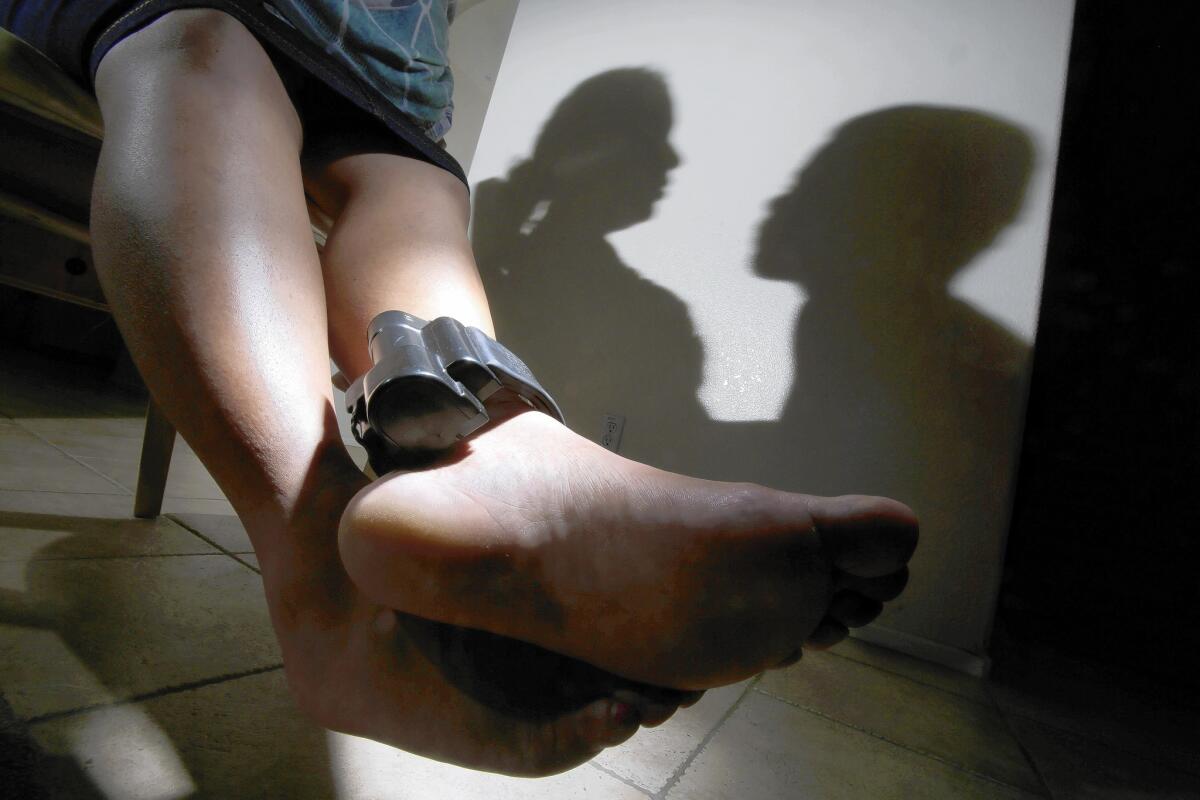Salvadoran immigrant and son settle for safety, if not compassion

- Share via
Yaneth, who wears an electronic monitoring device on her ankle, sat in the living room of a Fontana house and told me her story.
Over the last several years, back home in El Salvador, she paid gang members $500 here, $1,000 there. As the owner of a small store and rental agency, she understood that paying the “street tax” was better than the alternative in a town terrorized by gangs.
When they came back and demanded $2,000, she paid that, too. She had witnessed the murder of a neighboring family, and four of her relatives had been killed, including a cousin who refused to be the girlfriend of a cartel member. But then they began threatening to kidnap her 6-year-old son.
In February, Yaneth, 30, decided they had to flee. It would be a perilous journey, but maybe not as perilous as staying. El Salvador is one of the world’s most dangerous countries, and she was willing to risk getting to the U.S. for her son’s sake. So she phoned an aunt, who had settled in California’s Inland Empire nearly 40 years ago after fleeing El Salvador’s political violence, and asked for help.
“She was crying,” says Aunt Elva (I’m not using the full names of Yaneth and her family because they fear retaliation from the gang, which operates in California, too).
Elva, who lives legally in the U.S., told me she’s conflicted about the recent wave of immigrants, especially children. She doesn’t know how we can accommodate them by the thousands, and yet she understands the depths of poverty and violence they’re fleeing. In the case of her niece, she knew it might be impossible for Yaneth to get permission to travel legally to the U.S., and she couldn’t turn her back on family.
So Yaneth found a coyote who charged $3,500 a head, and relatives here sent her $7,000.
In late February, she and her son Vladimir packed two small suitcases and set out on a six-week journey. By car, bus and van, it took several days to get to Mexico, which they easily crossed into. Vladimir missed his father and grandfather, but Yaneth tried to keep his spirits up. That wasn’t too difficult until they were dropped off at a warehouse in the northern Mexican border town of Reynosa.
“There were a lot of people and it was terrible,” says Yaneth. “I got threatened. My kid was threatened. They wanted another $3,500 and they wanted it quickly.”
Aunt Elva got a call from the smugglers.
“They said if they didn’t get the money, they were going to torture them,” she says.
Aunt Elva sent the money and after a harrowing month in the warehouse, Yaneth and Vladimir were escorted to the Rio Grande, where they boarded a raft in the middle of the night. It took only a short time to cross into Texas, but when they stepped onto the muddy banks and climbed a hill, they were caught in the glare of flashlights, and Yaneth’s heart sank.
It was the Border Patrol.
For four days they were kept in holding cells with hundreds of other refugees. It was miserably cold, Yaneth said, and guards scolded her for having attempted to crash the border. She was sure they’d be deported quickly, though she had asked for sanctuary.
But then she got a surprise. Agents told her she could stay with family while her case was processed. She was given two bus tickets to San Bernardino and told to stay with her aunt in Fontana. She was also told to report immediately to the immigration office in Los Angeles.
Yaneth briefly considered fleeing to Nevada to stay with another relative. But she didn’t want to keep running or breaking the law, so she reported to the Immigration and Customs Enforcement office, where she got her ankle bracelet. And now she awaits a chance to plead for either mercy or asylum.
Her chances of prevailing?
“Very slim,” said Hilda Cruz, Justice for Immigrants coordinator for the Catholic Diocese of San Bernardino.
Cruz, who sat in on my interview along with two representatives of the Los Angeles Archdiocese, is coordinating assistance for 25 families in the same situation as Yaneth.
Asylum is generally not being granted to those who fear violence as opposed to outright persecution at home. But Jessica Dominguez, an immigration attorney, told me there might be other options to explore.
Here now since April, Yaneth said she knows there’s some support in the U.S. for Central American refugees, and plenty of contempt, too. She watched coverage of protesters in Murrieta screaming and shaking fists over the arrival of families like hers.
“It’s very sad because these people don’t know what suffering you went through in your own country,” said Yaneth.
Cruz was less diplomatic.
“As a person of faith and as a citizen of the United States, it saddens me to see the lack of compassion,” Cruz said of the protesters, adding that the U.S. has a direct role in Central American violence. “It has to do with how we consume drugs in the United States. That’s what this is about.”
Yaneth said she has faith she’ll be allowed to stay. She’d like to find a job and go to college while working to pay back her aunt.
Cruz was not surprised by Yaneth’s optimism. When you’re safe, she said, you’re filled with hope.
More to Read
Sign up for Essential California
The most important California stories and recommendations in your inbox every morning.
You may occasionally receive promotional content from the Los Angeles Times.











